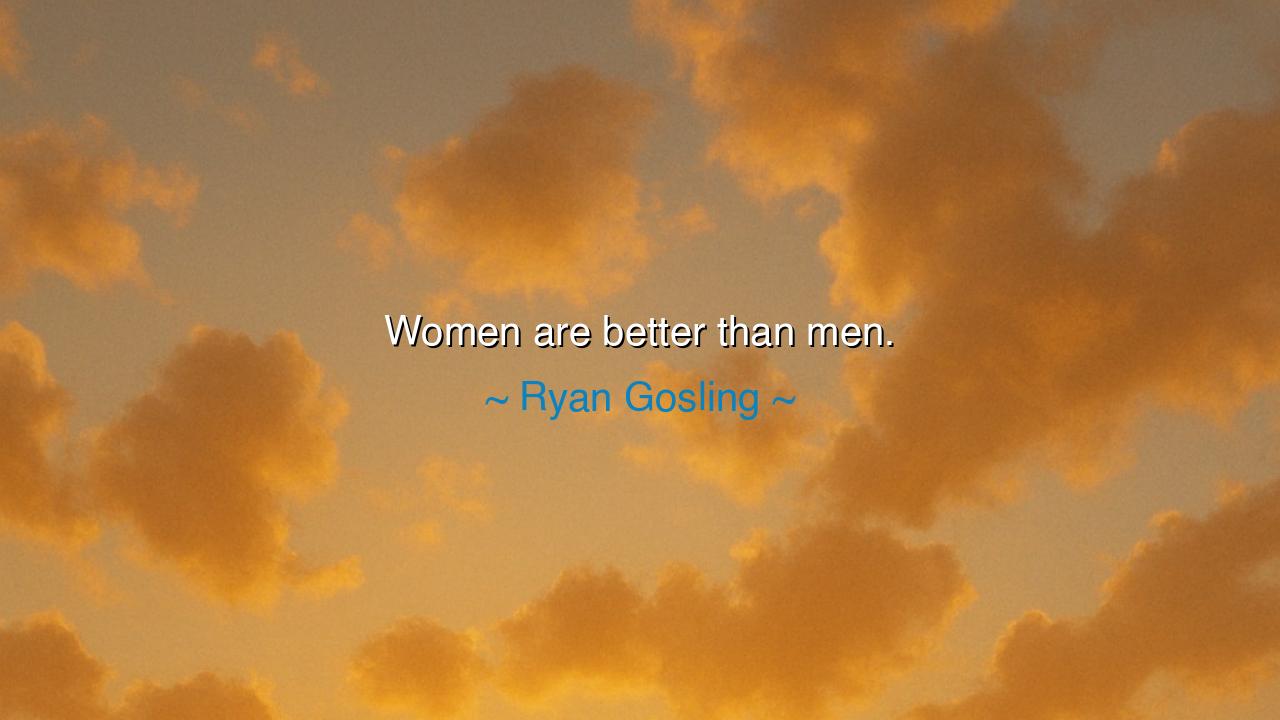
Women are better than men.






The words of Ryan Gosling, “Women are better than men,” shine with simplicity yet carry the force of an ancient truth too long ignored. They are not mere flattery, but recognition of the resilience, wisdom, and depth of spirit that women have borne across the ages. In a world that often glorified the strength of men in war and conquest, Gosling’s words turn the gaze toward the quiet, enduring power of women—their ability to create, to nurture, to endure suffering, and to rebuild what destruction has torn down.
The ancients knew, though they seldom admitted, that civilization rests more on the labor of women than on the swords of men. Men fought wars, but women preserved the home; men claimed thrones, but women sustained bloodlines and culture. To say that women are “better” is to recognize that their strength lies not only in survival, but in their ability to bear life itself, to carry generations within their bodies, and to hold communities together when all else falls apart.
Consider the tale of Sojourner Truth, born into slavery yet rising to become one of the fiercest voices for freedom and justice. She endured cruelty that broke many men, yet her spirit remained unyielding. In her famous speech, “Ain’t I a Woman?”, she reminded the world that women could plow fields, endure lashings, and carry burdens equal to or greater than any man. Her life revealed what Gosling’s words affirm: that the strength of women is often not loud, but it is unbreakable.
At the same time, Gosling’s words can be read as a rebuke to a culture that for centuries exalted men as superior. By declaring the opposite, he unsettles the old hierarchy and forces reflection. Perhaps women are not merely “equal,” but have shown themselves to possess a deeper resilience—a greatness forged not in privilege, but in trial. For while men have often been the makers of wars, women have been the menders of their aftermath.
So let this wisdom endure: to honor women is not to diminish men, but to recognize the truth that humanity’s survival has rested more in the hands of mothers, healers, and visionaries than in generals and kings. If women are indeed “better,” it is because they have carried the weight of both their own burdens and those of men as well. Let the future remember: the measure of greatness is not conquest, but creation—and in this, women have always led the way.






VBPHAM VAN BINH
Ryan Gosling’s comment is certainly eye-catching, but it makes me wonder: why do we have to compare men and women at all? Can we truly say one is 'better' than the other, or should we focus on celebrating the qualities of both without pitting them against each other? Isn’t the goal to reach a place of mutual respect and understanding, where both genders are equally valued?
MYMin Yunki
There’s something bold and provocative in Ryan Gosling’s statement, but it also raises questions about the nature of gender dynamics. Does claiming women are 'better' perpetuate stereotypes that women are inherently superior in certain ways? Shouldn’t we move towards a world where the value of an individual isn’t measured by gender but by their character, actions, and contributions?
KNKy Nha
Ryan Gosling’s quote may sound empowering, but it also invites us to think about the implications of making broad statements about gender. Is it helpful to say that one gender is 'better' than another, or does it play into the divisiveness we often see in discussions about gender equality? How can we move beyond comparisons and focus on true equality for both men and women?
HHhhhhhiiii
It's interesting how Ryan Gosling’s quote challenges traditional gender roles by elevating women over men. However, is this statement counterproductive? Does it perpetuate a binary, competitive view of gender, rather than fostering equality and respect? Wouldn't it be better to recognize that both men and women have unique qualities that, when combined, make for a balanced society?
KTThien Kim Tran
While Ryan Gosling's statement might be seen as a compliment to women, it also raises a deeper question: why are we still comparing genders in terms of superiority? Does making such comparisons inadvertently reinforce the notion that men and women are competing rather than complementing one another? Can we get to a place where we appreciate each gender's unique strengths without ranking them?